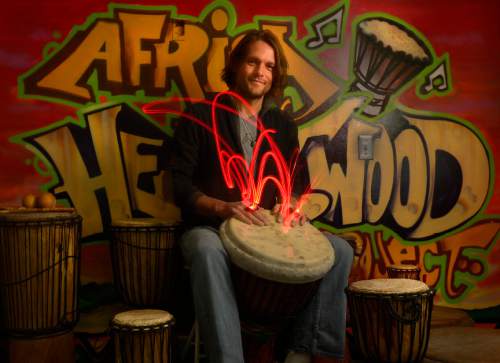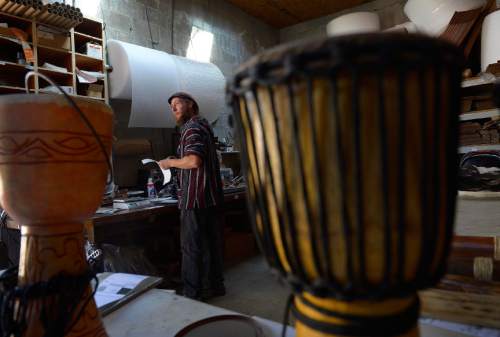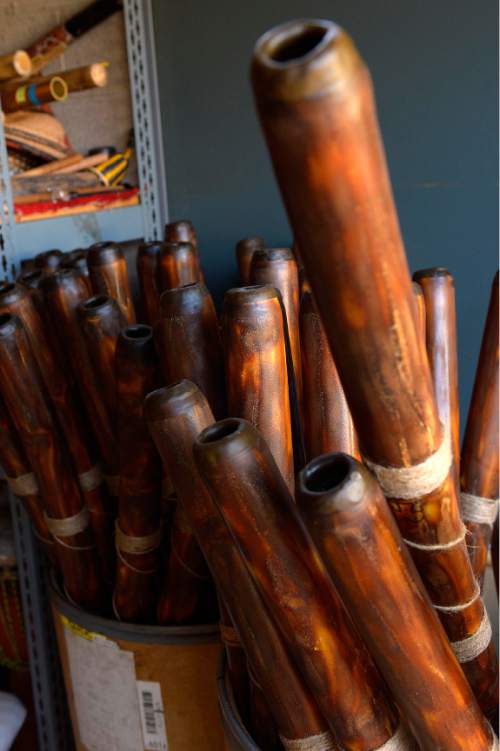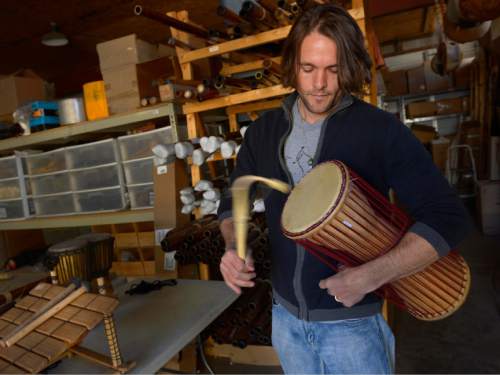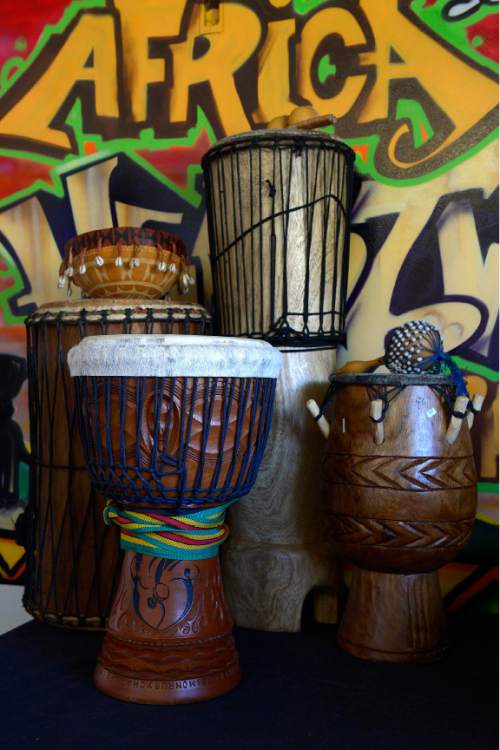This is an archived article that was published on sltrib.com in 2014, and information in the article may be outdated. It is provided only for personal research purposes and may not be reprinted.
It's not about drums, says Andy Jones, who imports the handmade instruments from West Africa, it's about people.
The Djembe drums, carved from hardwood trees and topped with stretched goatskin, provide more than the cultural underpinning of Liberia, Sierra Leone and Ghana — they also have become the avenue for the former Brigham Young University theater major to bring hope and self-reliance to West African orphans.
Jones, who lives in Salt Lake City, began selling Djembes to support African drum carvers and, later, to underwrite an orphanage in Ghana. That grew into his nonprofit Africa Heartwood Project, which is in the midst of expanding a new orphanage in Liberia — the Heartwood Homestead — and developing freshwater wells for surrounding communities.
His path to this avocation followed an unusual trajectory. As a young man growing up in Jerome, Idaho, population 11,000, Jones took an interest in theater and dance. But his choice of Ghana for a honeymoon in 1999 after he married his hometown sweetheart, Kayla Thompson, is perhaps more telling of someone who moves to, well, a different beat.
"It was like a humanitarian honeymoon and an adventure of our own," the now 37-year-old recalls. "We wanted to start our marriage off on a humanitarian note. And I was interested in drumming and dance. So, we said, 'Let's go to Africa.' "
In Ghana, the couple got more than they had bargained for. A civil war in nearby Liberia had left many parentless children streaming into Ghana to escape the violence. The Idaho newlyweds traveled to the Buduburam Refugee Camp, a journey that changed their lives.
"Our experience in Africa was very intense and eye-opening," Jones says. "To see that kind of poverty — it causes one to question a lot of things."
The fighting is over, but now the scourge of Ebola hangs over West Africa. How many more orphans it will leave is unknowable.
Upon the couple's return to BYU in 2000, Jones changed his major to international development with an emphasis on African studies. He kept a modern-dance minor.
As the honeymooners were departing Ghana, Jones had agreed with some local drum makers to sell Djembes for them. Soon dozens of drums began arriving at their Provo apartment wrapped in burlap.
"I didn't know what to do," he recalls. "So I sold some to friends and sold some on eBay and sent the money back through Western Union."
Although he wanted to help West Africans, Jones realized he was ill prepared. The answer seemed not to simply provide money or programs, which he feared could disrupt area economies and social structures, yielding what he called "neocolonialism" that keeps locals dependent on gifts from foreigners.
"You have to care. You have to want to help somebody," he says. "But that's not enough. It's difficult to provide real help."
To that end, Jones sought a master's degree in international education and development at the University of Sussex in England.
"It's about following the heart," he says, "but it doesn't always make financial sense."
Nonetheless, at that point, Jones had yet to commit to operating an orphanage long term. "I thought I'd be working for USAID [the U.S. Agency for International Development] or UNICEF."
—
Lean machine • After England, Jones gave the orphanage idea one more shot. He devised a business plan in which he would buy the drums from the African carvers — rather than sell the Djembes for them — and retail the instruments for a modest profit.
But as he geared up the drum-sales business from 2005 to 2008, he realized he was operating a for-profit business.
"And I began to not enjoy it," Jones remembers. "It wasn't what I wanted to do. I don't see myself as a business person."
That's when he set upon the notion to separate the orphanage charity from the drum business. Selling drums would allow him the financial means to continue on his charitable mission. He founded Africa Heartwood Project in 2008, a nonprofit 501(c)3, that spent 100 percent of its funds to open the orphanage in Ghana to house, cloth and educate some 50 youngsters.
"Children who are orphaned I see as having the greatest need," Jones says. "We try to build them into individuals who can take care of their own needs."
But getting the nonprofit off the ground was daunting, he recalls. His mother donated money. He put payments for orphanage food on his credit cards. And he began seeking contributors who could sponsor food for a child for $50 a year.
One significant donor is Plant Therapy Essential Oils, an Idaho company owned and operated by Andy Jones' brother, Chris Jones.
"He's been doing it for a lot of years and he's sticking to it," Chris Jones says of his brother. "He puts so much energy into Africa Heartwood Project that his for-profit business [Djembe Direct] suffers. His priority is helping other people."
Another donor, Garrick Hyde of the World Nativity charity in South Jordan, says Jones sets a good example.
"He runs a real lean organization so that all of the funds [from Africa Heartwood Project] go to the children, rather than administration," Hyde says. "If everyone had his desire to help, the world would be a very different place."
In 2010, Africa Heartwood Project bought 10 acres of seaside land in Liberia about 20 miles northwest of the capital of Monrovia. Jones and his organization — which relies on volunteers as well as a small paid staff — launched construction of the Heartwood Homestead. The facility eventually could house 80 orphans. It boasts farming, freshwater wells, solar energy and sustainable human waste management.
It took about two years to move the operation from Ghana to Liberia, the home country of the orphans. And it's still a work in progress.
"People need to know we need financial help," says Andy Jones, who has returned to West Africa more than a dozen times. "This is grass roots. We don't have a government grant."
—
African beat • Another aspect to Jones' activities demands attention.
Every year, he stages a drum show with kids and Repertory Dance Theatre called "Ring Around the Rose" at the Rose Wagner Performing Arts Center in downtown Salt Lake City. His African Heartwood Drum & Dance Ensemble also conducts various private and public performances throughout the year. Jones teaches African drumming periodically at University of Utah Continuing Education classes and offers private lessons — usually for beginner and intermediate-level musicians — through djembedirect.com.
"It's about getting African dance in front of the public," he says. "It's a chance to build a community. We can always use more dancers and more drummers."
One such drummer, retired teacher Kathy Gambles of Ogden, says Jones' performance and instruction "create joyful connections."
She started drumming about five years ago and, through Weber State University, soon discovered Jones and what he is doing.
"It's almost goose-bumpy the doors he has opened," she says.
But it hasn't been easy, explains Jones' mother, Jan Jones, who lives in Jerome and spent four months working at the orphanage earlier this year.
"I've been amazed that he continues," she says of Andy, one of her six children. "It's a frustrating and troublesome job trying to bring change to the truly poor."
But helping the people of West Africa is his calling.
The Ebola virus has yet to reach the Heartwood Homestead orphanage near Zuannah Town, but everyone is on guard, Jones says, quoting the orphanage director, Rufus Doe.
"Rufus says, 'We are not hugging people in Liberia any more.' "
Nonetheless, Jones, who is clearly taken by West Africans, continues to send all the love he can — one dance at a time, one drum at a time, one donation at a time.
Orphans and drums
The handmade African drums are available at djembedirect.com. The Africa Heartwood Project charity — africaheartwoodproject.org — is seeking 1,300 donors to give $13.13 a month for 13 months. It also is soliciting sponsors to underwrite expenses for each orphan.


